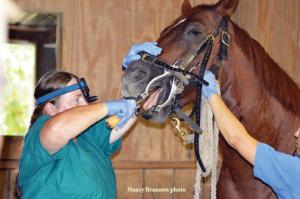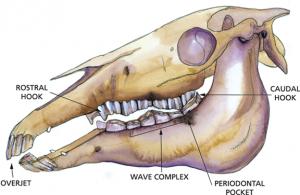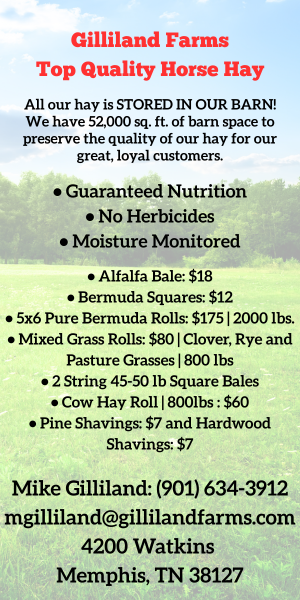By Jennifer Dunlap, DVM
Do you have regular appointments with your veterinarian for dental check-ups for your horse? At least once a year, usually when getting your horses’ regular check-ups, vaccinations, and Coggins tests, is a good time to have your horse’s teeth checked. If they are developing sharp edges, it may be time to have their teeth “floated.” In this photo, Dr. Jennifer Dunlap “floats” Tessa’s teeth (Tessa is a chestnut Quarter Horse mare).
We include an oral exam in each yearly physical exam so dental problems can be caught early. Dental exams are a very important part of a horse’s health care because horses’ teeth erupt through the gum line throughout much of their lives. Consequently, horses’ teeth require different care than a human’s teeth.
The horse’s jaws are also different from humans’ too. The lower jaw is narrower than the upper jaw. A horse’s chewing motion is normally not up-and-down, but outside-to-inside on a slant determined by the slant of the matching surfaces of the upper and lower cheek teeth. The jaw structure and chewing motion sometimes allow the formation of sharp points on the insides of the lower teeth. These sharp points cause injury to the tongue and discomfort when a horse is ridden. Sharp edges can also form on the outsides of the upper teeth, causing sores in the soft tissue of the cheeks.
Other dental issues which can arise include hooks, ramps, broken teeth, and infected teeth – all of which can cause a horse a lot of pain.
If the oral/dental exam identifies problems, then “floating,” aka the correcting of sharp points, hooks and ramps, can be performed with an oral speculum, allowing good visualization of the teeth. Hand floats or non-motorized floats and motorized floats can be used.
To make it easy on the horse, IV sedation and careful positioning of the head for the horse’s comfort are paramount. If more serious problems are identified during the dental exam, care and treatment can be discussed with your veterinarian at that time.
If you want to find out more about how your horses chew, eat their food, and equine dental care, there are several online resources available.
Arnott, Rob, DVM. “Equine Dental Care: What Every Horse Owner Should Know.” AAEP website:
https://aaep.org/horsehealth/equine-dental-care-what-every-horse-owner-should-know
YouTube video: Equine Dental Care: How Horses Chew. Equine Dentist Dr Mark Burnell explains how horses chew and how they adjust their chewing motion according to the level of fibre in the feed they are ingesting. https://www.youtube.com/watch?v=pBX2qza4wwQ
YouTube Stall13.com video: How Horses Chew Their Food and Use Their Teeth. BJ Rickard https://www.youtube.com/watch?v=ZBjht_2NjgY
Do you have regular appointments with your veterinarian for dental check-ups for your horse? At least once a year, usually when getting your horses’ regular check-ups, vaccinations, and Coggins tests, is a good time to have your horse’s teeth checked. If they are developing sharp edges, it may be time to have their teeth “floated.” In this photo, Dr. Jennifer Dunlap “floats” Tessa’s teeth (Tessa is a chestnut Quarter Horse mare).
We include an oral exam in each yearly physical exam so dental problems can be caught early. Dental exams are a very important part of a horse’s health care because horses’ teeth erupt through the gum line throughout much of their lives. Consequently, horses’ teeth require different care than a human’s teeth.
The horse’s jaws are also different from humans’ too. The lower jaw is narrower than the upper jaw. A horse’s chewing motion is normally not up-and-down, but outside-to-inside on a slant determined by the slant of the matching surfaces of the upper and lower cheek teeth. The jaw structure and chewing motion sometimes allow the formation of sharp points on the insides of the lower teeth. These sharp points cause injury to the tongue and discomfort when a horse is ridden. Sharp edges can also form on the outsides of the upper teeth, causing sores in the soft tissue of the cheeks.
Other dental issues which can arise include hooks, ramps, broken teeth, and infected teeth – all of which can cause a horse a lot of pain.
If the oral/dental exam identifies problems, then “floating,” aka the correcting of sharp points, hooks and ramps, can be performed with an oral speculum, allowing good visualization of the teeth. Hand floats or non-motorized floats and motorized floats can be used.
To make it easy on the horse, IV sedation and careful positioning of the head for the horse’s comfort are paramount. If more serious problems are identified during the dental exam, care and treatment can be discussed with your veterinarian at that time.
If you want to find out more about how your horses chew, eat their food, and equine dental care, there are several online resources available.
Arnott, Rob, DVM. “Equine Dental Care: What Every Horse Owner Should Know.” AAEP website:
https://aaep.org/horsehealth/equine-dental-care-what-every-horse-owner-should-know
YouTube video: Equine Dental Care: How Horses Chew. Equine Dentist Dr Mark Burnell explains how horses chew and how they adjust their chewing motion according to the level of fibre in the feed they are ingesting. https://www.youtube.com/watch?v=pBX2qza4wwQ
YouTube Stall13.com video: How Horses Chew Their Food and Use Their Teeth. BJ Rickard https://www.youtube.com/watch?v=ZBjht_2NjgY










